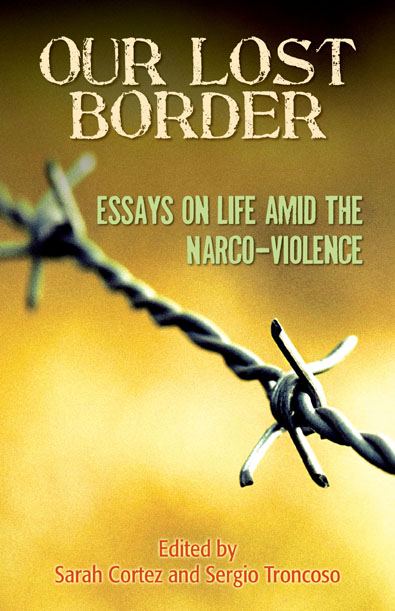Our Lost Border: Essays on Life Amid the Narco-Violence
$19.95
edited by Sergio Troncoso & Sarah Cortez, foreword by Rolando Hinojosa
A fascinating collection of personal essays by Mexicans and Americans about how drug violence has changed life along the border.
ISBN: 978-1-55885-752-0
Published: March 30, 2013
Bind: Trade Paperback
Pages: 224
Available
In his essay lamenting the loss of the Tijuana of his youth, Richard Mora remembers festive nights on Avenida Revolución, where tourists mingled with locals at bars. Now, the tourists are gone, as are the indigenous street vendors who sold handmade crafts along the wide boulevard. Instead, the streets are filled with army checkpoints and soldiers armed with assault rifles. “Multiple truths abound and so I am left to craft my own truth from the media accounts—the hooded soldiers, like the little green plastic soldiers I once kept in a cardboard shoe box, are heroes or villains, victims or victimizers, depending on the hour of the day,” he writes.
With a foreword by renowned novelist Rolando Hinojosa and comprised of personal essays about the impact of drug violence on life and culture along the U.S.-Mexico border, the anthology combines writings by residents of both countries. Mexican authors Liliana Blum, Lolita Bosch, Diego Osorno and María Socorro Tabuenca write riveting, first-hand accounts about the clashes between the drug cartels and citizens’ attempts to resist the criminals. American authors focus on how the corruption and bloodshed have affected the bi-national and bi-cultural existence of families and individuals. Celestino Fernández and Jessie K. Finch write about the violence’s effect on musicians, and María Cristina Cigarroa shares her poignant memories of life in her grandparents’ home—now abandoned—in Nuevo Laredo.
In their introduction, editors Sarah Cortez and Sergio Troncoso write that this anthology was “born of a vision to bear witness to how this violence has shattered life on the border, to remember the past, but also to point to the possibilities of a better future.“ The personal essays in this collection humanize the news stories and are a must-read for anyone interested in how this fragile way of life—between two cultures, languages and countries—has been undermined by the drug trade and the crime that accompanies it, with ramifications far beyond the border region.









